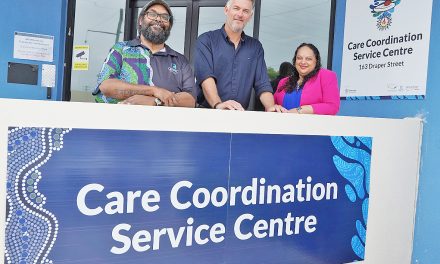Aboriginal Health Worker Shaniqua Burke has discovered that hard work can get you places you never thought possible.
The 21-year-old from Napranum in Queensland’s northern peninsula area credited hard work for helping her win Aboriginal and Torres Strait Islander Student of the Year at the Queensland Training Awards this year.
Now, with a Certificate III in Aboriginal and/or Torres Strait Islander Primary Health Care from TAFE Queensland under her belt, the opportunities are limitless.
The proud Kunjen/Kokoberra woman from Kownyama and Napranum said her grandparents, Kowanyama Mayor Robbie Sands and his wife Donna, had instilled in her a drive to succeed.
“I’d say my grandfather and grandmother are my biggest inspirations,” Shaniqua said. “They’ve always taught me that education is a vital pillar in your life and so is working hard.”
“They’ve always been great role models and, you know, they’ve always shown me what it’s like to be a better person in the world, she said. “Everything starts at home—making a child feel important, making them feel smart. And that’s what they’ve done; they believed in me. They’ve been an inspiration for to me to become bigger and better.”
Shaniqua worked hard in high school to be accepted into the mainstream curriculum.
“At school, the Indigenous students had different criteria to non-Indigenous students, and I worked hard to get in a higher class because I wanted to go to uni after school,” she said.
“We were in a separate class where we’d study a curriculum such as low English or Prevocational Maths, while other students studied the mainstream education criteria.”
After finishing high school, Shaniqua took up a position with a job services company that had a strong community engagement focus. She realised she wanted to help her people and be at the ground level of improving community health.
“Growing up, a lot of family members and members of the community had all sorts of chronic conditions,” Shaniqua said.
“(Many of them) did not know much about their conditions or why they were in that type of state.
“So, when I worked in community engagement, it opened my mind, and I decided I wanted to do something that could help people with chronic conditions.”
Shaniqua commenced a Certificate III in Aboriginal and Torres Strait Islander Public Health after landing a job as a trainee health worker in Apunipima Cape York Health Council’s Napranum clinic.

Shaniqua credited an inspiring TAFE teacher with pushing her to keep studying when work and family commitments were almost too much.
“At first it was just a certificate requirement for the job,” she said.
But the teacher, Daniel Noble, made the course interesting.
“So, I guess doing the class, it made me want to just study more for my own learning and not just as a starting point for the requirements of the job,” she said. “I want to keep learning in that sphere and open my mind.”
Here again, Shaniqua’s understanding of hard work stood her in good stead when she came home from work or trips away
to TAFE in Townsville. She had to work around family, job and community responsibilities to make sure her assignments were done well and on time.
“I went to TAFE in Townsville every eight weeks for two weeks, so I was away a lot from home,” she said. “I had to complete assessments and I wouldn’t get that time at work. So, it’d be just trying to make up that time at home, but I couldn’t focus much, you know; you have your family around and you’ve got other responsibilities to attend to at home. But in the end, it was just making it an important mission to complete.”
The recognition of her hard work has helped her believe that it was all worth it in the end.
“It made me feel relieved in a way,” she said. “Working academically hard in school and, you know, subsequently achieving a lot of stuff. But I’m now able to see that and recognise that for myself.”
The community-minded young woman said she wanted to make a career in primary health and gained the most satisfaction out of helping community live longer, happier, healthier lives.
I wanted to do nursing, but you know, working in the health worker role for a while made me realise we were a first point of contact for our people,” she said.
“They come to us first before anyone: before a nurse, before a doctor; and I get satisfaction staying at that level. It just makes me feel a bit comfortable and closer to them.
“So maybe in the future I’ll just study more primary health electives and go higher into an Advanced Diploma in Primary Health.”
At first, like many young people aching to get out and see the world, Shaniqua wanted to leave Napranum. But though the world is her oyster, she’s happy for the moment, just where she is.
“I think I’ve sort of grown into the role here,” she said.
“When you move to the city, you don’t feel the sense that you’re doing something. So, staying in community means going to sleep at night, feeling that I’ve prevented somebody from being one step closer to a chronic condition or helping somebody change their lifestyle to live longer.
“But in the city, you meet 10,000 different people and you don’t get to see your help paying off.”











